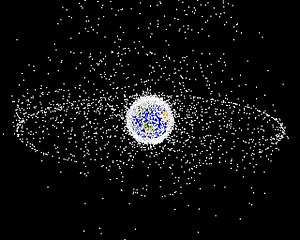Trash? In Space?

December 12, 2017
More than 500,000 pieces of debris are floating in the earth’s orbit as of right now and they pose a threat to all space vehicles, and potentially us on earth.NASA has taken it seriously and has guidelines on how to deal with it.
This “Space trash” is both meteorites and junk from us humans on our space missions. More than 20,000 of those are larger than a softball. They also travel at more than 17,500 miles per hour, which is enough to interfere with a spacecraft, even tiny paint flecks can damage windows traveling at that velocity. Surprisingly, with the amount of debris it is weird how we haven’t had more disastrous collisions. The reason is that most debris is trackable, the risk is in the debris that isn’t trackable, and millions pieces of space debris are not trackable as of this point. Luckily, most pieces burn up in the earth’s atmosphere, not posing much of a threat down here where we live on earth – as of now.
‘’It’s kind of understood, that it’s the price of living in this modern world.’’
Says Mr. Ferron, who is a science teacher here at triton, who teaches forensics and marine bio.
Ferron says that most of the time you know that any space debris should incinerate, or burn, and since most of the earth is water, the chances are that any pieces left should fall into the ocean and not threaten human life. In an example of what can come close to going horribly wrong, from 1973 – 79, there was a lab in space called SkyLab, operated solely by the United States, it weighed 170,000 pounds. When they were preparing to take it out of orbit, NASA calculated that the chance of it hitting a person was 1 in 152.
´´With any human endeavor there is risk.´´
They decided to aim it 810 miles southeast of Cape Town, the largest city in South Africa, which is far from any person. The problem was that it didn’t burn as fast as expected, so slow to the point that they could see firework type flares in Australia. So in our modern world, with space travel, space trash is a big problem, and will continue to be until we decide to do something more than we are doing now.

